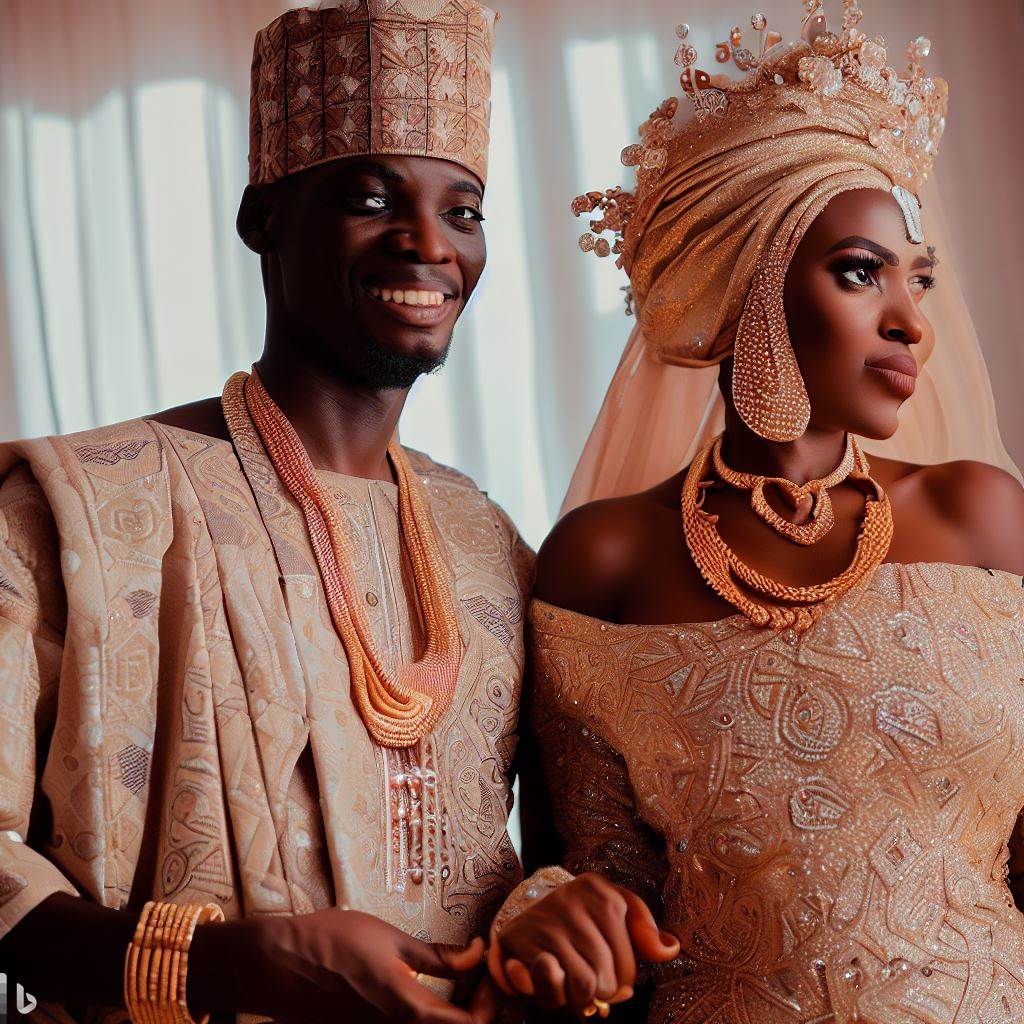Introduction
A. Definition and importance of sustainable fashion design
Sustainable fashion design focuses on creating clothing and accessories that are environmentally friendly, using materials and practices that have a smaller carbon footprint.
This approach is crucial to combat the negative environmental and social impacts of the fashion industry.
It aims to minimize waste, reduce water and energy consumption, and promote fair labor practices.
By adopting sustainable fashion design, we can contribute to a greener and more ethical future.
B. Setting the context for the growing trend in Nigeria
Nigeria is a country that has been facing challenges regarding environmental degradation and waste management.
The fashion industry has been a significant contributor to these issues, with its reliance on fast fashion and disposable clothing.
However, there is a growing awareness and interest in sustainable fashion design among Nigerian designers and consumers.
This can be attributed to the increased access to information about the harmful impacts of the fashion industry and the desire to create positive change.
The emerging trend of sustainable fashion in Nigeria reflects a shift towards conscious consumerism and a commitment to preserving the environment.
Basically, sustainable fashion design plays a vital role in addressing the environmental and social challenges posed by the fashion industry.
In Nigeria, there is a growing trend towards embracing sustainable fashion, driven by the desire for a greener and more responsible fashion industry.
Sustainable Fashion Design in Nigeria: Current State
A. Overview of the Nigerian fashion industry
- The Nigerian fashion industry has experienced significant growth and recognition in recent years.
- It is a vibrant and dynamic sector that contributes to the country’s economy and cultural identity.
- Nigerian designers have gained international acclaim for their creativity and innovation.
- The industry supports the entire value chain, from fabric production to retail, creating employment opportunities.
B. Challenges faced in implementing sustainable fashion design practices
- Limited access to sustainable materials and technologies poses a challenge for Nigerian designers.
- Lack of awareness about sustainable practices among consumers hinders the demand for sustainable fashion.
- Limited government support and inadequate policies discourage the adoption of sustainable practices.
- Cost implications and production constraints make it difficult for designers to embrace sustainable design.
C. Examples of sustainable fashion brands in Nigeria
- Minku: This Nigerian brand uses ethically sourced materials such as vegetable-tanned leather to create stylish handbags and accessories.
- Orange Culture: Known for their gender-fluid designs, Orange Culture incorporates sustainable practices through the use of organic materials and fair trade production.
- L’Espace: This multi-brand fashion retailer promotes sustainable fashion by curating collections from local designers who prioritize sustainable practices.
- Studio 189: Founded by Nigerian actress Rosario Dawson and Ghanaian fashion designer Abrima Erwiah, Studio 189 focuses on sustainable fashion and artisanal craftsmanship.
- Imaatu: Imaatu is a sustainable fashion brand that uses upcycled fabrics and promotes ethical production practices.
Generally, sustainable fashion design in Nigeria is a growing trend with immense potential.
The Nigerian fashion industry showcases creativity and innovation, making positive strides towards sustainability.
However, several challenges hinder the widespread adoption of sustainable practices.
Limited access to sustainable materials, lack of awareness among consumers, and inadequate government support are major obstacles.
Despite these challenges, numerous sustainable fashion brands have emerged in Nigeria, offering ethically-made and stylish products.
With further awareness, support, and collaboration, sustainable fashion can become a significant part of the Nigerian fashion industry, contributing to a more environmentally and socially responsible future.
Read: Fashion Design in Nigeria: A Guide to Finding a Job
Factors Driving the Growing Trend of Sustainable Fashion Design in Nigeria
A. Increased consumer demand for ethical and eco-friendly fashion
Rising consumer awareness of the negative impact of fast fashion on the environment has led to a growing demand for sustainable fashion options in Nigeria.
Consumers are becoming more conscious of the social and environmental consequences of their clothing choices.
They are seeking out fashion brands that prioritize ethical practices and use eco-friendly materials and production methods.
The demand is driven by the desire to support businesses that align with their values and contribute to a healthier planet.
Nigerian consumers are increasingly willing to pay a premium for sustainable fashion as a way to make a positive impact.
B. Rise of conscious consumerism and awareness of environmental issues
The rise of conscious consumerism in Nigeria has played a significant role in the growing trend of sustainable fashion design.
People are becoming more aware of the environmental issues caused by the fashion industry, such as water pollution and textile waste.
This awareness has led to a shift in consumer behavior, with individuals making more informed choices and actively seeking sustainable alternatives.
Conscious consumerism involves considering the social and environmental impact of one’s purchasing decisions, prompting the demand for sustainable fashion.
C. Influence of social media and celebrities promoting sustainable fashion
The power of social media and celebrity endorsements cannot be underestimated in driving the growing trend of sustainable fashion in Nigeria.
Influencers and celebrities have a significant impact on shaping trends and consumer behavior.
Many Nigerian celebrities are now actively promoting sustainable fashion on their social media platforms and during public appearances.
Their influence encourages their followers to adopt more sustainable fashion choices, creating a ripple effect throughout society.
Social media platforms serve as a powerful tool for spreading awareness about sustainable fashion brands and their products.
Consumers are exposed to a wide range of sustainable fashion options, fostering a desire for these eco-friendly alternatives.
Essentially, the growing trend of sustainable fashion design in Nigeria is driven by increased consumer demand for ethical and eco-friendly fashion, the rise of conscious consumerism and awareness of environmental issues, as well as the influence of social media and celebrities promoting sustainable fashion.
As more Nigerians prioritize sustainability in their fashion choices, the industry is likely to witness further growth and innovation in the years to come.
Read: The Role of Culture in Nigerian Fashion Design Industry

Benefits and Opportunities of Sustainable Fashion Design for Nigeria
A. Economic benefits and job creation
- A growing sustainable fashion industry can stimulate economic growth in Nigeria.
- Sustainable fashion designers can provide employment opportunities for local artisans and craftsmen.
- Increased production of sustainable fashion garments can lead to the exportation of Nigerian-made products.
- Local businesses can benefit from the supply chain of sustainable fashion materials and accessories.
- Sustainable fashion design can contribute to the development of Nigeria’s textile and garment sector.
B. Preservation of Nigeria’s cultural heritage through sustainable fashion
- Sustainable fashion design allows for the incorporation of traditional Nigerian textiles and techniques.
- Nigerian designers can create innovative designs that embrace cultural heritage and contemporary fashion trends.
- Sustainable fashion can revive interest in traditional crafts and preserve indigenous knowledge and practices.
- The use of Nigerian-made textiles in sustainable fashion supports local weavers and artisans.
- Through sustainable fashion design, Nigeria can showcase its rich cultural heritage to the world.
C. Improved environmental impact and reduced carbon footprint
- Sustainable fashion design promotes the use of eco-friendly materials and production processes.
- By reducing the reliance on synthetic fabrics and chemical dyes, Nigeria can reduce pollution and waste.
- Sustainable fashion brands prioritize ethical sourcing and fair trade practices, benefiting local communities.
- Recycling and upcycling of textiles reduce the demand for new materials and minimize landfill waste.
- Embracing sustainable fashion design can lead to a greener future for Nigeria and the fashion industry as a whole.
In general, sustainable fashion design in Nigeria brings several benefits and opportunities.
It has the potential to stimulate economic growth, create job opportunities, and support the preservation of Nigeria’s cultural heritage.
Additionally, it allows for improved environmental impact and a reduced carbon footprint.
By embracing sustainable practices, Nigeria can position itself as a leader in the global fashion industry while promoting social and environmental responsibility.
Read: Education for Fashion Designers in Nigeria: What You Need
Explore Further: Becoming an Illustrator in Nigeria: A Beginner’s Guide
Initiatives and Innovations Promoting Sustainable Fashion Design in Nigeria
A. Government policies and support for sustainable fashion
- The Nigerian government has recognized the importance of sustainable fashion and implemented policies to support it.
- One such policy is the creation of the Nigerian Sustainable Fashion Week, an annual event that showcases sustainable fashion designers.
- Government initiatives also include funding opportunities for sustainable fashion start-ups and training programs for designers.
- By offering support and incentives, the government encourages the growth of sustainable fashion in Nigeria.
B. NGOs and organizations driving sustainable fashion initiatives
- Several non-governmental organizations (NGOs) and organizations play a significant role in promoting sustainable fashion in Nigeria.
- One example is the Ethical Fashion Initiative, which works with Nigerian artisans to create sustainable and ethical fashion products.
- Other organizations, such as Fashion Revolution Nigeria, raise awareness about the environmental and social impact of the fashion industry.
- These initiatives create platforms for sustainable fashion designers to showcase their work and drive change within the industry.
C. Collaboration between fashion designers, artisans, and craftsmen
- Collaboration between fashion designers, artisans, and craftsmen helps promote sustainable fashion in Nigeria.
- This collaboration allows for the utilization of traditional craftsmanship techniques and sustainable materials.
- Fashion designers work closely with local artisans to create unique pieces that incorporate traditional Nigerian techniques.
- These collaborations not only support local artisans but also create sustainable and culturally rich fashion designs.
In essence, various initiatives and innovations are driving the growth of sustainable fashion in Nigeria.
Government policies and support, NGOs and organizations, and collaborations between designers and artisans all contribute to this trend.
With continued efforts and support, sustainable fashion in Nigeria will continue to thrive, bringing positive change to the industry.
Read: How to Start a Fashion Design Business in Nigeria
You Might Also Like: Nigeria’s Interior Design Trends: What’s Hot in 2023?
Overcoming Challenges in Implementing Sustainable Fashion Design in Nigeria
Achieving sustainable fashion design in Nigeria comes with several challenges.
However, with the right measures in place, these hurdles can be overcome to promote a thriving sustainable fashion industry in the country.
A. Education and awareness programs for fashion designers
- Organizing workshops and seminars to educate fashion designers on sustainable practices.
- Collaborating with educational institutions to include sustainability in fashion design curriculums.
- Encouraging designers to incorporate sustainable techniques into their work through incentives and recognition.
- Creating platforms for knowledge sharing and networking among sustainable fashion designers.
- Promoting the use of sustainable materials and techniques through targeted marketing campaigns.
- Engaging influential figures in the fashion industry to endorse and champion sustainable fashion practices.
B. Access to sustainable materials and ethical supply chains
- Supporting local farmers and artisans to produce eco-friendly fabrics and materials.
- Establishing partnerships with international suppliers of sustainable textiles and materials.
- Certifying and verifying suppliers to ensure transparency and ethical practices.
- Creating a database of sustainable suppliers and manufacturers accessible to fashion designers.
- Providing financial support and incentives to fashion designers to source sustainable materials.
- Fostering collaborations between fashion designers and local artisans to promote traditional craftsmanship and sustainable practices.
C. Funding and investment for sustainable fashion startups
- Implementing government initiatives and grants specifically targeted towards sustainable fashion startups.
- Encouraging private investors to support sustainable fashion businesses through venture capital and funding.
- Establishing sustainable fashion incubators providing mentorship, resources, and financial support.
- Creating crowdfunding platforms dedicated to supporting sustainable fashion projects.
- Connecting sustainable fashion startups with financial institutions for funding opportunities.
- Organizing networking events and pitch competitions to attract investors and generate interest in sustainable fashion.
In short, while there may be challenges in implementing sustainable fashion design in Nigeria, the potential benefits far outweigh the obstacles.
By focusing on education, access to sustainable materials, and funding opportunities, the country can create a thriving sustainable fashion industry that contributes to economic growth and environmental preservation.
Conclusion
A. Recap of the growing trend of sustainable fashion design in Nigeria
Sustainable fashion design in Nigeria has been gaining momentum in recent years, with designers and consumers alike recognizing the importance of eco-friendly and ethical practices.
Local designers have been incorporating sustainable materials, traditional craftsmanship, and innovative techniques into their designs, creating unique pieces that reflect the rich cultural heritage of the country.
B. Call to action for individuals to support and embrace sustainable fashion
It is crucial for individuals to support and embrace sustainable fashion in Nigeria.
By making conscious choices in our purchasing decisions, we can encourage the growth of sustainable fashion and contribute towards a greener and fairer fashion industry.
Opting for sustainable brands, reusing and recycling clothes, and embracing slow fashion can all make a significant impact.
C. Closing thoughts on the future of sustainable fashion in Nigeria
The future of sustainable fashion in Nigeria looks promising.
As more people become aware of the environmental and social impact of the fashion industry, there will be an increased demand for sustainable alternatives.
With the creative talents and entrepreneurial spirit of Nigerian designers, sustainable fashion will continue to evolve and flourish, contributing to a more sustainable and ethical fashion industry globally.
By supporting these designers and embracing sustainable practices, we can collectively create a better and more conscious fashion future in Nigeria and beyond.




